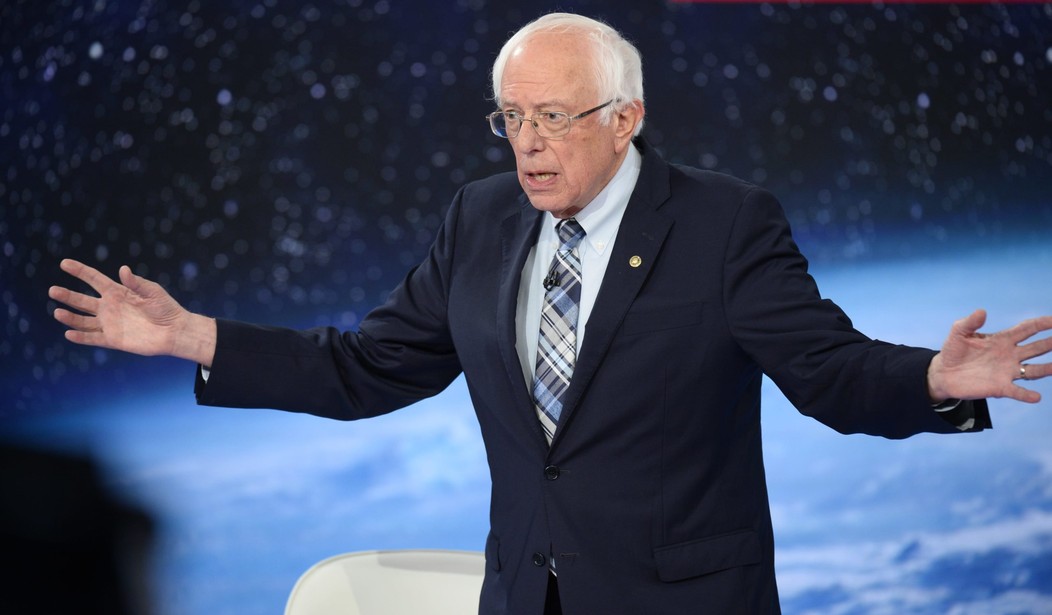On Monday, Sen. Bernie Sanders (I-Vt.), a 2020 Democratic presidential candidate, came up with yet another way to justify the high taxes that won’t come close to paying for his socialist agenda. In the name of fighting income inequality, Sanders would increase taxes on companies that pay their CEOs 50 to 500 times their median worker pay. This new tax may sound promising to angry liberals envious of the super-rich, but it is wrongheaded on many levels — and won’t come close to footing the bill for Sanders’ programs.
“Workers in this country should not be paid totally inadequate wages while CEOs make outrageously high compensation packages,” the Sanders Income Inequality Tax Plan declares. “Bernie’s Income Inequality Tax Plan raises taxes on companies with exorbitant pay gaps between their executives and typical workers.”
The Sanders website singled out five CEOs who make more money than the median worker at their companies. For example, Walmart’s CEO made $23.6 million last year, 1,076 times more than the median Walmart worker’s $21,952. JPMorganChase CEO Jamie Dimon made more than $30 million, 381 times more than the median employee’s $78,923.
The plan would “impose tax rate increases on companies with CEO to median worker ratios above 50 to 1. If the CEO did not receive the largest paycheck in the firm, the ratio will be based on the highest-paid employee.” The plan set forth six brackets for tax increases, based on the gap between the median salary and the top salary at a company.
“The conversation on CEO pay is rife with anecdotal evidence and conjecture,” Heritage Foundation tax expert Adam Michel told PJ Media. “I think the most compelling evidence shows that CEO pay has increased not because of some non-market force, but simply because CEOs have become more valuable to their companies as large firms must navigate more costly regulatory environments and a more complex global market.”
In fact, Michel suggested that CEOs might even be underpaid — they might receive in wages a smaller proportion of the actual value they contribute to the company. “There is some evidence that among large firms the average worker is actually paid a larger portion of their value added than the CEO,” he said.
“A new tax on CEO pay will have little impact on executive compensation while not actually helping the workers who need it most. The U.S. has already tried taxing CEO pay, and it hasn’t worked,” Michel added. “Businesses pay their employees what the market demands and levying new taxes on high pay will just make U.S. businesses less able to compete globally, expand their workforces, or raise wages of rank and file workers. Policies that are actually designed to help low-income Americans should focus on removing barriers to success and increasing business investment.”
Concerns about income inequality are arguably a distraction from what Americans truly care about: opportunity and the availability of good jobs.
“However, all of this is beside the point. The conversation about inequality distracts from the more important topic of opportunity,” Michel argued. “Average Americans care about finding a steady job, getting their children a good education, and putting food on the table. On this most important margin of opportunity, there is a lot of good news.”
Bernie Sanders’ self-described democratic socialism would undermine the booming economy and the opportunities it provides, however.
Sanders promises to erase student debt, abolish medical debt, extend Medicare-style health care coverage to all, raise the minimum wage, and save the environment with the Green New Deal boondoggle. Each of these plans aims to take the prosperity available through hard work and economic productivity and assign it to everyone as a universal right. This ignores the basic nature of the economy: people are willing to work for the ability to purchase certain goods and services, and making those “free” would suddenly remove the incentive other people have to work in order to produce those goods and services.
Sanders’ hypocritical approach to even something as comparatively simple as the minimum wage illustrates how unworkable his policies truly are. When employees on his campaign complained that Sanders did not pay them $15/hour, he responded by cutting workers’ hours. This proved Sanders’s opponents correct, showing that a government-mandated minimum wage forces companies to change their practices in ways that will hurt the very workers the government intends to help.
Massive government intrusion into the economy would kill the goose that lays the golden eggs. Americans enjoy widespread levels of freedom, wealth, and opportunity unheard of in the history of the world. Bernie Sanders’ programs threaten to derail the free market-limited government system that enables that freedom, prosperity, and opportunity.
Worse, his plans are entirely unworkable, even if he were to tax the “rich” at 100 percent. According to a Heritage Foundation study published last month, confiscating all incomes above $200,000 and confiscating all corporate profits would still fall $13.2 TRILLION short of paying for the low estimate of Medicare for All and the Green New Deal.
“It is arithmetically impossible to pay for progressive promises by ‘taxing the rich,'” David Burton, Heritage’s senior fellow in economic policy, wrote in the study. “Progressive promises are too expensive—and the amount of income earned by the rich is too small. Even using lower cost estimates, confiscating every dollar earned by every taxpayer with incomes of $200,000 or more would only pay for about half of the progressive agenda.”
Americans would be well-served by targeted reforms aimed at the problems with the current system, rather than wide-ranging radical “revolutions” that will wreck the economy, hypercharge the debt, and stop the prosperity Americans seem increasingly to take for granted.
CEO pay is not the problem: the crazed ideas of envious radicals like Bernie Sanders poses a far greater threat.
Follow Tyler O’Neil, the author of this article, on Twitter at @Tyler2ONeil.









Join the conversation as a VIP Member